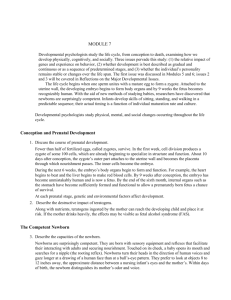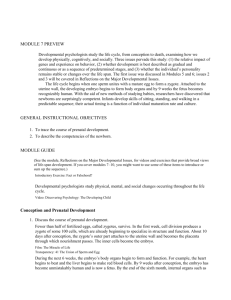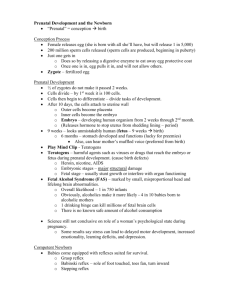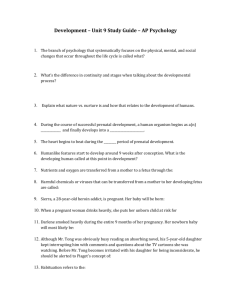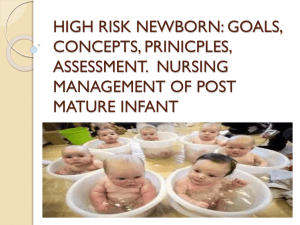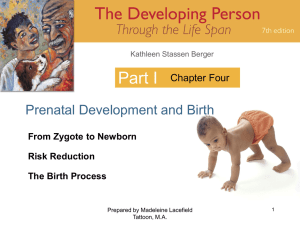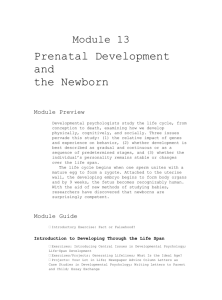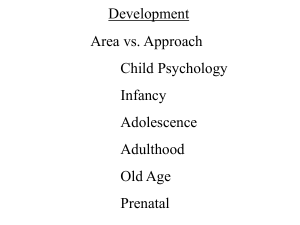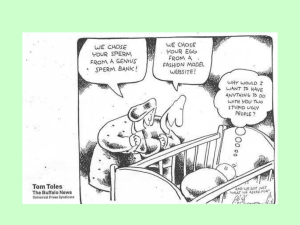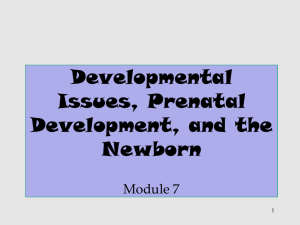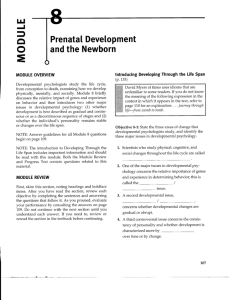Developmental Issues, Prenatal Development, and the Newborn
advertisement
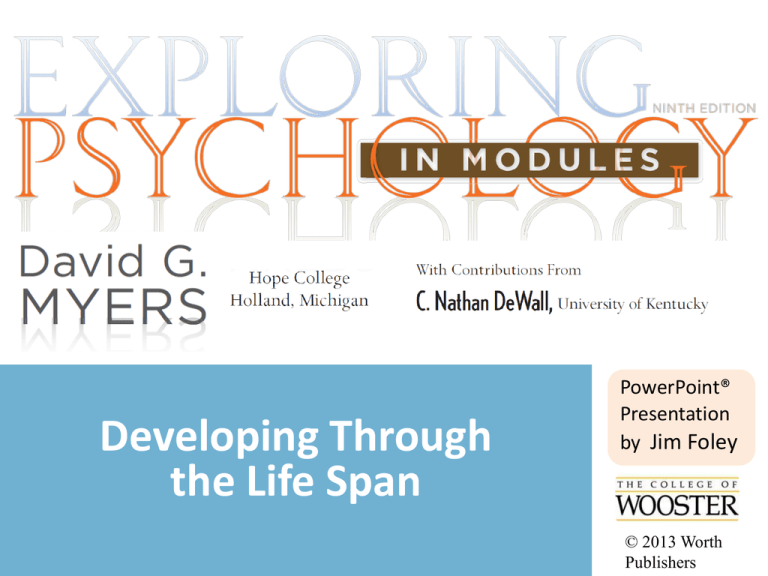
Developing Through the Life Span PowerPoint® Presentation by Jim Foley © 2013 Worth Publishers Module 9: Developmental Issues, Prenatal Development, and the Newborn Topics we’ll be bringing to life Issues in Thinking about Development Nature and Nurture Continuity and Stages Stability and Change Prenatal Development Conception Zygote Embryo Fetus Teratogen Risks Newborn Skills and Behaviors Module 9: Developmental Issues, Prenatal Development, and the Newborn Topics we’ll be bringing to life Issues in Thinking about Development – Continuity and Stages – Stability and Change Prenatal Development – Conception Zygote – Embryo Fetus – Teratogen Risks Newborn Skills and Behaviors nature and nurture How do genes and experience guide development over our lifespan? change and stability Issues in Developmental Psychology continuity and stages In what ways do we change as we age, and in what ways do we stay the same? Is development a gradual change or are there some leaps to a new way of thinking or behaving? Nature, Nurture, and Differences Childhood involves a genetically-driven process of maturation, AND a process of interacting with, and being formed by, the world of objects and media, parents and peers. When racial or ethnic or gender groups of people differ from each other in traits or abilities, the differences within groups tends to be greater than the difference between groups. Why? The environment and culture affects all of us, but due to our similar biological heritage, it affects us in much the same way. Genetic variations within groups affect traits and behavior more than the variations between groups. Continuity vs. Stages, Nurture and Nature Researchers who see development as a function of experience tend to see development as continuous and gradual. Nurture is continuous. Researchers who focus on biological maturation see spurts of growth and other changes that make one stage of development very different from another. Nature has stages. Stages and Continuity Three different types of development--cognitive, moral, and psychosocial--have been running in parallel. Are they really separate stages, or a continuous process of development? Change and Stability Are there some parts of who we are that remain stable throughout development? Our temperament? Our overall personality? Do some of our attributes change during development (even while we maintain our sense of identity)? Our abilities? Our interests? Our habits? Our traits? Stability and Change Are we essentially the same person over long periods? Some answers from research: In general, temperament seems stable. Traits can vary, especially attitudes, coping strategies, work habits, and styles of socializing. Personality seems to stabilize with age. Stability helps us form identity, while the potential for change gives us control over our lives. Starting the Path to Personhood: Prenatal Development and the Newborn Conception Prenatal Development The Competent Newborn In the beginning: Sperm and egg unite to bring genetic material together and form one organism: the zygote (the fertilized cell). Conception Prenatal Development The Zygote Stage: First 10 to 14 Days After the nuclei of the egg and sperm fuse, the cell divides in 2, 4, 8, 16, 100… Milestone of the zygote stage: cells begin to differentiate into specialized locations and structures Implantation: The Embyro, 2 to 8 weeks This stage begins with the multicellular cluster that implants in the uterine wall. Milestone of the implantation stage: differentiated cells develop into organs and bones Embryo The Fetus At nine weeks, hands and face have developed; the embryo is now called a fetus (“offspring”). Placenta At 4 months, many more features develop. Milestone of the fetal stage: by six months, the fetus might be able to survive outside the womb Fetal Life: The Dangers Dangers • Teratogens (“monster makers”) are substances such as viruses and chemicals that can damage the developing embryo or fetus. • Fetal Alcohol Syndrome (FAS) refers to cognitive, behavioral, and body/brain structure abnormalities caused by exposure to alcohol in the fetal stage. Fetal life: Responding to Sounds Fetuses in the womb can respond to sounds. Fetuses can learn to recognize and adapt to sounds that they previously heard only in the womb. Fetuses can habituate to annoying sounds, becoming less agitated with repeated exposure. After the fetal period, the child is born! The Competent Newborn Inborn Skills Reflexes are responses that are inborn and do not have to be learned. Newborns have reflexes to ensure that they will be fed. The rooting reflex--when something touches a newborn’s cheek, the infant turns toward that side with an open mouth. The sucking reflex can be triggered by a fingertip. Crying when hungry is the newborn talent of using just the right sounds to motivate parents to end the noise and feed the baby. More Inborn Abilities Newborns (one hour old!) will look twice as long at the image on the left. What can we conclude from this behavior?
